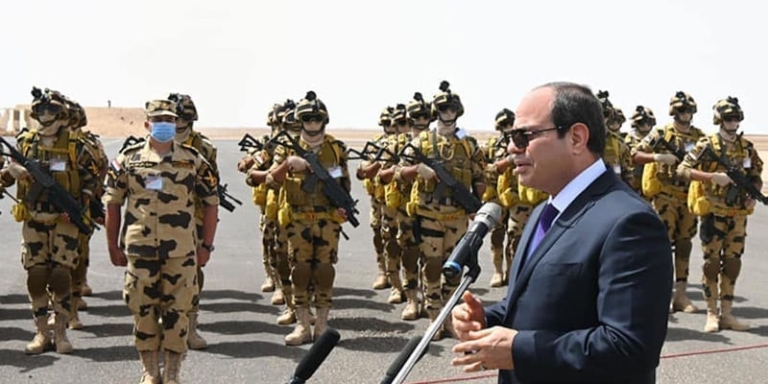
On June 20, Egypt’s President Abdel-Fattah el-Sisi threatened direct military intervention in Libya if the forces of the United Nations-supported Government of National Accord (GNA), led by Fayez al-Sarraj, advanced toward the city of Sirte and the military base of al-Jufra. In fact, GNA forces reached the outskirts of the city on June 11 where military operations stopped amid confusion regarding future moves. Sisi considered the north-south Sirte-Jufra axis a red line that should not be crossed by the GNA and its backer, Turkey. It was the first time Sisi made such threats publicly, which raises the questions: to what extent can such threats be realized and implemented? What are the implications of Egypt’s military involvement in Libya for regional stability?
Embedded Fears
Sisi’s threats reflect a deep sense of fear and frustration over the recent political and military developments in Libya. There is a need to contextualize the Egyptian president’s reactions. First, Sisi’s threats came after the humiliating defeat of the forces of his Libyan ally, the warlord General Khalifa Haftar. Not only has Haftar’s offensive operation to capture the Libyan capital, Tripoli–– which began in April 2014 and was backed by Egypt, the United Arab Emirates, France, and Russia––failed miserably but he also lost control over important and strategic cities in western Libya such as Tarhouna, Bani Walid, and the strategic air base of al-Watiya. Backed by Turkish drones and military equipment, GNA forces advanced toward the city of Sirte and al-Jufra where Haftar’s troops, supported by mercenaries from Russia, Sudan, and Chad and backed by Egypt, the UAE, and France, are preparing to turn the tide against the GNA’s forces.
Sisi fears the increasing role and influence of Turkey in Libya. Over the past few months, Turkey succeeded in building a strategic partnership with the GNA; this enabled Ankara to turn the tide against Haftar and his allies and redraw the conflict map.
Second, Sisi fears the increasing role and influence of Turkey in Libya. Over the past few months, Turkey succeeded in building a strategic partnership with the GNA; this enabled Ankara to turn the tide against Haftar and his allies and redraw the conflict map. Indeed, Turkey views Libya as a new sphere of influence in North Africa and it plans for a long-term political, economic, and military relationship with any legitimate government in Tripoli. Recently, a senior Turkish delegation headed by Foreign Minister Mevlut Cavusoğlu visited Tripoli and held talks with GNA officials. Cavusoğlu was accompanied by Finance Minister Berat Albayrak and intelligence chief Hakan Fidan. Sisi strongly believes that the GNA’s control of Sirte and al-Jufra would inexorably empower Turkey and come at the expense of Egypt’s interests in Libya. It is thus critical for him to halt such an advance before it gets out of control.
Third, Sisi is eyeing Libya’s massive energy resources, considering them essential for achieving his mega development projects in Egypt. He also wants to secure his government’s share in Libya’s future reconstruction plans, which would grant Egypt’s military companies massive financial returns. Finally, Sisi believes that a normal political process in Libya would necessarily bring Islamists into power, an outcome that is considered a real red line for him and his regional supporters, particularly the UAE and Saudi Arabia. To be sure, a democratically elected government in Tripoli would constitute an existential threat to Sisi and other authoritarian governments in the region.
Re-prioritizing Egypt’s National Security
Sisi’s strategy in Libya stems from his national security perspective. It aims to achieve three objectives: 1) managing the chaos and instability on Egypt’s western borders; 2) creating a loyal and friendly government in Tripoli that would serve the interests of Sisi and his allies (particularly the UAE and Saudi Arabia) in the region; and 3) preventing Turkey from gaining a foothold in Libya and North Africa. Historically, Egypt’s western borders were the quietest and of least concern to the Egyptian state. The threats usually came either from the eastern front with fears of foreign invasion and occupation (such as with the Israeli occupation of Sinai in 1967 and the growing problem of radical groups and insurgency) or from the southern front with Sudan, where the final borders between the two countries are contested and became a source of sporadic tensions between Cairo and Khartoum. Nowadays, the major threat to Egypt’s national security stems from the distant south, namely from Ethiopia’s Grand Renaissance Dam, which would have major impact on the very source of life for Egyptians: the Nile River.
The major threat to Egypt’s national security stems from the distant south, namely from Ethiopia’s Grand Renaissance Dam, which would have major impact on the very source of life for Egyptians: the Nile River.
After Sisi came to power in 2014, Egypt’s national security priorities shifted noticeably to focus more on the western border with Libya. Egypt has its longest border with Libya (around 693 miles), which runs from the Mediterranean Sea in the north to the tripoint border with Sudan in the south. However, these borders never constituted a serious threat to Egypt’s national security in past decades. Apart from fighting illegal immigration, human trafficking, and the drugs and weapons trade, which were usually controlled by military and police patrols in coordination with the Libyan authorities, Egypt has not suffered existential threats coming from the Libyan side of the border. Nevertheless, with the removal of Colonel Muammar Qadhafi in 2011 and the ensuing chaos and instability in Libya, threats and risks to Egypt’s security from its western border have increased.
The emergence of radical and extremist groups such as the Islamic State, coupled with the mounting conflict in Libya, became a major concern for Sisi’s regime. In fact, some of the terrorist attacks in Egypt were planned and facilitated by radicals in Libya. For example, on July 19, 2014, at least 21 Egyptian soldiers were killed by heavily armed gunmen at a checkpoint on the Farafra Oasis in Egypt’s western desert, about 120 miles from the Libyan border. Another major attack on November 2, 2018, targeted a group of Egypt’s Christians and led to the killing of at least 28 people who were on their way to a pilgrimage. Not surprisingly, the Egyptian military conducted several military operations in the western desert against militants and radicals who were believed to be behind these attacks. Moreover, Egypt conducted airstrikes against radicals inside Libya; for example, on February 16, 2015, Egyptian warplanes bombed Islamic State targets in the eastern city of Derna in retaliation for the beheading of 21 Egyptian Christians. Therefore, securing Egypt’s western border with Libya has become a priority for Sisi.
Sisi’s Blunders in Libya
Sisi’s handling of the security dilemma on Egypt’s western border with Libya suffered many blunders, creating new threats and problems for Egypt’s national security rather than mollifying those already there. First, instead of mediating among the factions fighting in Libya, Sisi, for his own reasons, chose to side with General Haftar—the one faction that lacks legitimacy and credibility. Backing a warlord who usurped power in the eastern region of Libya has tarnished Egypt’s image as a credible mediator; in fact, some Libyans now view Sisi as an adversary and not a mediator. Second, Sisi provided unequivocal political, diplomatic, and military support to Haftar over the past five years, which only deepened and prolonged the conflict in Libya. The longer the conflict persists, the more risks and threats Egypt will face. Third, not only have Sisi’s recent threats of a military intervention in Libya created more divisions among the fighting parties in Libya but they also have jeopardized Egypt’s interests and security. The GNA viewed Sisi’s threats as a “declaration of war” and it pledged to confront them; this could lead to further escalation of the conflict. Finally, supporting Haftar has alienated the GNA and this could cost Egyptian contractors billions of dollars during a future reconstruction process.
Not only have Sisi’s recent threats of a military intervention in Libya created more divisions among the fighting parties in Libya but they also have jeopardized Egypt’s interests and security.
Will Egypt Intervene in Libya?
It is hard to believe that Sisi’s regime is not already involved, one way or another, in Libya militarily. After all, Sisi has provided military and logistical support to Haftar over the past five years. Furthermore, and as mentioned earlier, Egypt conducted military strikes inside Libya in 2015 and reports attribute to Cairo the latest strikes at al-Watiya air base. However, the vital question is whether Sisi will directly get involved in Libya and put boots on the ground.
Sending Egyptian troops to Libya is highly unlikely for very different reasons. First, it would be the first time in history for the Egyptian military to fight alongside militias and mercenaries from Russia, Sudan, and Chad, and this could damage the reputation of the Egyptian army in the long run. Second, there’s no guarantee that such an intervention, if it takes place, would be quick and effective or put an end to the conflict in Libya. It would actually be quite the opposite and would exacerbate the situation there. Third, fighting in a civil war could cost vast loss of life for the Egyptian army, and this may threaten the cohesion of the Sisi regime internally. Finally, Sisi would be in direct conflict with the GNA and its backers, particularly Turkey, which could trigger an unneeded regional war. Therefore, it is highly doubtful that Sisi would send troops to Libya to save his ally Haftar while jeopardizing his rule and tarnishing the Egyptian army’s reputation.
However, there are other scenarios to which Sisi might resort in order to maintain his interests in Libya. One is to intensify airstrikes against the GNA’s forces and its Turkish defense systems, especially in Sirte and al-Jufra. That has actually been the case over the past few weeks during which Egypt’s Rafale fighter jets conducted some air strikes to halt the GNA forces’ advance toward the city of Sirte. The second scenario is to provide special military support at the level of air defense for Haftar’s forces in order to strengthen their defensive ability and to maintain the status quo along the Sirte-al-Jufra axis. The third scenario is to arm Libyan tribes and prepare them militarily so they become the nucleus of an army loyal to Egypt as well as to support them so they fight the war against the forces of the GNA. That is exactly what President Sisi explicitly called for on June 20 in his speech regarding military intervention in Libya. Of these three scenarios, the first one remains closest to reality.
The foregoing provides a serious basis for Egyptian restraint when it comes to military action in Libya. In fact, Egypt’s strategy there seems to be counterproductive as it might create more instability and chaos. It is clear that the ongoing conflict next door endangers the national interests of Egypt and of all the regional actors.

